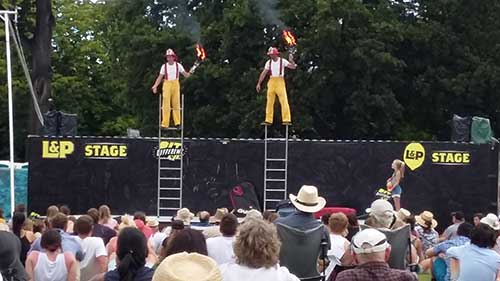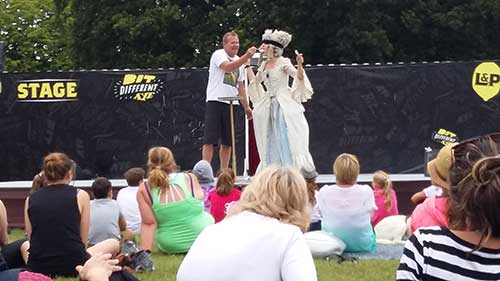
The annual World Buskers Festival has just concluded in Christchurch. The weather was dreadful at the start of the week (yes – just keep repeating the mantra, “There is no climate change!“)
Once again (I have blogged about buskers previously – if you want to read more, see “Similar Posts” below), I am taken by the repeated use of several dramatic devices – tropes. Seeing the same busker repeatedly, you see them using it effectively each time. And the same device is used right across a range of buskers.
An example: Get a child from the audience
1) raise the energy of the crowd by getting them to cheer not for the busker, but clap and cheer for the child (also, more people gather to see what all the excitement is about)
2) say that the child will get $10 for assisting; towards the end of the show get the crowd to enthusiastically respond if they think that the child’s part in the show was worth $10 = strong hint that the busker is worth about $10 from you…
There were good variants: get the child to walk around the edge of the “stage” (are area marked out by a rope) getting the audience to clap at the pace of the child. Get the child to go faster and faster…
The dynamics of busking
- Gather a crowd – from individuals and small groups to a united audience (and get it to grow)
- Get the crowd to participate (clapping; call and response – there are standard ways of doing this that regular busking crowds know, and those who are new soon pick up from the regulars)
- Go through your fixed routine, adapting it to the context, and to the reaction of the people
- Send the people away satisfied and transformed (oh yes – get some of their money)
Clearly, I have just described an allegory, a parable of community worship and of worship leadership. Can you think of parallels between busking and worship and worship leadership?

If you appreciated this post, do remember to like the liturgy facebook page, use the RSS feed, and signing up for a not-very-often email, …



Wearing funny clothes?
Yes, Peter, good point – some way to help people realise who is going to be running this. We use this for everything from police to nurses. Shops and cafes regularly follow this insight also, and we all know the awkwardness of shops that don’t follow this principle. I have, more than once, approached a fellow-shopper thinking they were working there, and the opposite – not realised someone was working there, thinking they were just a fellow-shopper. Blessings.
They have ‘festivals’.
Good point, thanks, Gillian. Blessings.